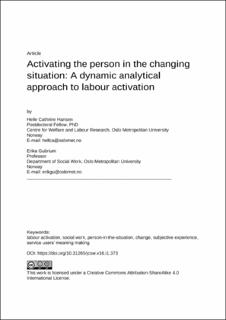| dc.contributor.author | Hansen, Helle Cathrine | |
| dc.contributor.author | Gubrium, Erika | |
| dc.date.accessioned | 2021-10-18T10:55:46Z | |
| dc.date.available | 2021-10-18T10:55:46Z | |
| dc.date.created | 2021-10-11T14:09:59Z | |
| dc.date.issued | 2021 | |
| dc.identifier.citation | Journal of Comparative Social Work. 2021, 16 (1), 61-84. | en_US |
| dc.identifier.issn | 0809-9936 | |
| dc.identifier.uri | https://hdl.handle.net/11250/2823658 | |
| dc.description.abstract | For several decades, the turn towards labour activation has dominated European social work and social work institutions. While social work research and practice focused on labour activation have long considered “the person in the situation”, exploring the service users’ experiences at specific moments and contexts in time, we argue that labour activation is an ongoing process involving a complex interplay of factors (structural, social, personal), and that these are shaped by changes and ruptures throughout a person’s life course. Furthermore, the changing situation is not an objective fact, though its meaning is actively constructed by the service user. Asking how participants in a labour activation programme subjectively make meaning of their activation experiences, with reference to changing personal histories and institutional encounters over time, we shift the focus from social work’s emphasis on “the person in the situation”, and we open the concept to include “the person in the changing situation” to help enable a more dynamic analysis of the activation process. The concept accounts for the interaction between subjective meaning making and institutional structures and offers, as these change over time. The study is based on fieldwork in the Norwegian labour and welfare services (NAV). We present three participants in the Norwegian Qualification Programme as illustrative cases, each with distinct profiles, to illustrate how service users actively refer to changing situations – as these are shaped by time, biography and institutional movement – when making meaning of their labour activation experiences. The findings have implications for social work research and practice, as matters of biography, timing and life course trajectories must be accounted for to gain a more accurate picture of the labour activation experience. A consideration of institutional and life course change also offers a better professional understanding of the complexity of lived experiences when working with service users, potentially enabling a more effective practice. | en_US |
| dc.language.iso | eng | en_US |
| dc.publisher | Department of Social Sciences | en_US |
| dc.rights | Navngivelse-DelPåSammeVilkår 4.0 Internasjonal | * |
| dc.rights.uri | http://creativecommons.org/licenses/by-sa/4.0/deed.no | * |
| dc.subject | Labour activation | en_US |
| dc.subject | Social work | en_US |
| dc.subject | Person-in-the-situation | en_US |
| dc.subject | Experiences | en_US |
| dc.title | Activating the person in the changing situation: A dynamic analytical approach to labour activation | en_US |
| dc.type | Peer reviewed | en_US |
| dc.type | Journal article | en_US |
| dc.description.version | publishedVersion | en_US |
| cristin.ispublished | true | |
| cristin.fulltext | original | |
| cristin.qualitycode | 1 | |
| dc.identifier.doi | https://doi.org/10.31265/jcsw.v16i1.373 | |
| dc.identifier.cristin | 1944938 | |
| dc.source.journal | Journal of Comparative Social Work | en_US |
| dc.source.volume | 16 | en_US |
| dc.source.issue | 1 | en_US |
| dc.source.pagenumber | 61-84 | en_US |
| dc.subject.nsi | VDP::Medisinske Fag: 700::Klinisk medisinske fag: 750::Gynekologi og obstetrikk: 756 | en_US |

